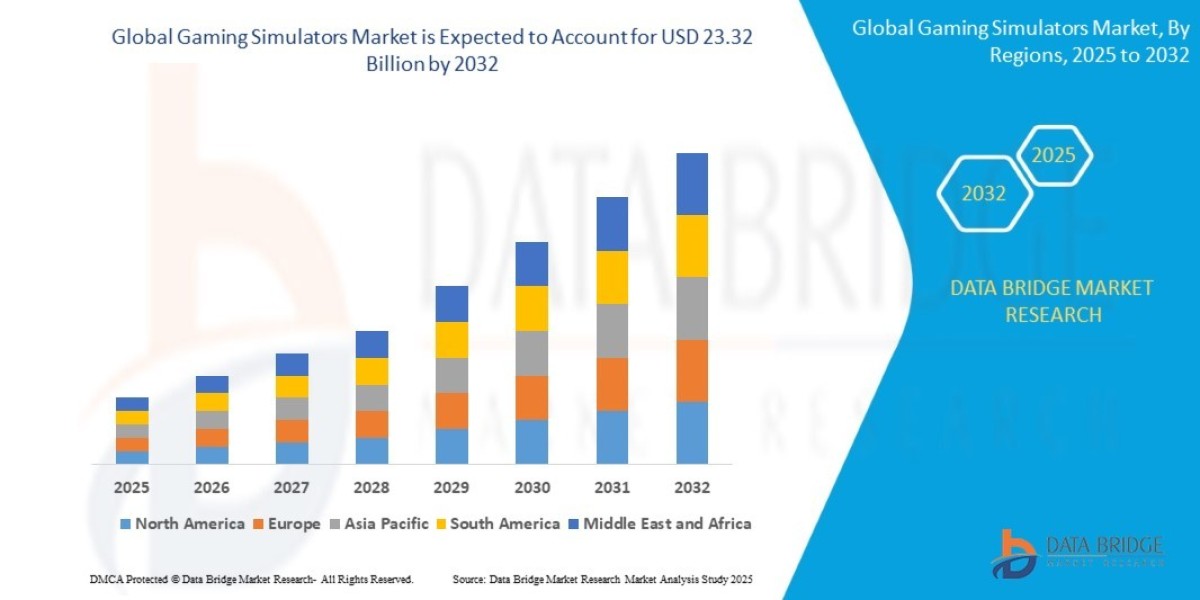Gaming Simulators Market Overview
The Gaming Simulators Market Size is experiencing robust growth driven by the rising adoption of immersive gaming technologies, the growing popularity of e-sports, and the increasing demand for realistic gaming experiences. In 2024, the market was valued at approximately USD 8.07 billion and is projected to reach around USD 23.32 billion by 2032, expanding at a CAGR of 17.50% during the forecast period.
Gaming simulators are advanced systems designed to replicate real-world environments and scenarios, allowing players to experience high levels of realism. They are widely used across entertainment, education, training, and professional sports sectors. The growth of virtual reality (VR), augmented reality (AR), motion sensors, and haptic feedback systems has revolutionized the gaming simulator industry, making it more interactive and life-like than ever before.
Competitive Landscape for Gaming Simulators Market
The Gaming Simulators Market is moderately fragmented, with global and regional players competing based on innovation, user experience, and affordability. Companies are focusing on developing AI-powered, modular, and customizable simulators to cater to both professional and recreational gamers.
Leading companies in the market areAEON RETAIL CO., LTD. (Japan), CKAS Mechatronics Pty Ltd (Australia), Hammacher Schlemmer & Company, Inc. (U.S.), Playseat (Netherlands), D-BOX (Canada), Sony Corporation (Japan), Eleetus LLC (U.S.), RSEAT Ltd (Serbia), Vesaro (U.K.), GTR Simulators (U.S.), Cruden (Netherlands), CXC Simulations (Australia), 3D Perception (Norway), Villers Enterprises Limited (U.K.), Alelo INC. (U.S.), Aero Simulation (U.S.), Atomic Motion Systems (U.S.), Lean Games (U.K.), The AEgis technologies (U.S.), Guillemot Corporation S.A. (France), SIMTECHPRO (Poland).
Gaming Simulators Market Drivers
- Rising Demand for Realistic and Immersive Gaming Experiences
Gamers are increasingly seeking lifelike gaming environments that offer a sense of presence and interactivity. Modern simulators integrate VR and motion platforms, creating an immersive experience that closely replicates real-world conditions. This trend is particularly strong in racing, flight, and shooting simulation games. - Technological Advancements in VR, AR, and Motion Tracking
Rapid innovation in VR and AR technologies is enhancing the sensory realism of simulators. The use of haptic feedback, AI-driven motion sensors, and 360-degree immersive displays is transforming the user experience, making simulation gaming more engaging and physically interactive. - Growth in Professional Training Applications
Beyond entertainment, gaming simulators are increasingly used in military, aviation, and sports training to improve skills in safe, controlled environments. Flight simulators, driving simulators, and sports simulators help professionals enhance reflexes, decision-making, and performance. - Integration of AI and Cloud Gaming
Artificial intelligence is being integrated into simulators to adapt difficulty levels and enhance player engagement, while cloud gaming platforms allow users to access high-quality simulation experiences without the need for expensive hardware.
Market Trends
- Shift Toward Multi-Sensory Experiences: Integration of audio, haptic, and motion feedback systems for more immersive gameplay.
- Adoption of Wireless VR Simulators: Increasing preference for wireless, tether-free VR systems for smoother experiences.
- Rise of Portable and Modular Simulators: Demand for compact simulators that can be easily customized or transported.
- Cross-Sector Applications: Adoption of gaming simulators in education, healthcare, and industrial training for experiential learning.
Gaming Simulators Market Segmentation
By Component:
- Hardware (Motion Platforms, Displays, VR Headsets, Controllers)
- Software (Game Engines, Simulation Software, AI Algorithms)
- Services (Installation, Maintenance, Upgrades)
By Type:
- Racing Simulators
- Flight Simulators
- Sports Simulators (Golf, Football, Tennis)
- Shooting Simulators
- Driving Simulators
- Others (Space, Adventure, and Educational Simulators)
By End-Use Industry:
- Residential/Individual
- Commercial (Gaming Centers, E-sports Arenas)
- Professional Training (Military, Aviation, Sports)
- Educational Institutions
By Technology:
- Virtual Reality (VR)
- Augmented Reality (AR)
- Mixed Reality (MR)
Regional Insights for Gaming Simulators Market
North America Dominates the gaming simulators market due to high consumer spending on advanced gaming hardware and widespread adoption of VR and AR technologies. The presence of leading simulator developers and e-sports organizations further supports market expansion in the region.
Europe Holds a significant share owing to the strong gaming culture in countries such as Germany, the UK, and France. The growing demand for racing and flight simulators, combined with innovation in motion platforms, contributes to regional growth.
Asia-Pacific Expected to witness the fastest growth, driven by the massive gamer population, thriving e-sports industry, and increasing investment in gaming cafes and simulation centers. China, Japan, and South Korea are major hubs for simulator-based gaming.
Latin America and Middle East & Africa regions are gradually adopting gaming simulators, supported by improving digital infrastructure, rising gaming interest, and entry of global brands into developing economies.
Emerging Opportunities in Gaming Simulators Market
- Expansion of E-sports Infrastructure: Growing investments in gaming arenas and tournaments will boost simulator sales.
- Integration of AI and Machine Learning: Intelligent systems that adjust difficulty and gameplay in real time will enhance user engagement.
- Increased Demand for Educational Simulations: Institutions are adopting simulators for training in fields like medicine, engineering, and safety.
- Development of Affordable Consumer-Grade Simulators: Technological advancements are enabling cost-effective solutions for home users.
- Growth of the Metaverse: Interconnected virtual environments will create new use cases for gaming simulators in interactive digital spaces.
Gaming Simulators Market Challenges
- High Cost of Equipment: Advanced simulators require significant investment, limiting access for average consumers.
- Space and Setup Limitations: Physical installation space can be a constraint for residential users.
- Technical Compatibility Issues: Integration of VR hardware and simulation software requires standardization.
- Maintenance and Upgrades: Regular calibration and updates add to ownership costs.
Future Outlook for Gaming Simulators Market
The future of the Gaming Simulators Market Outlooks highly promising, fueled by rapid technological evolution and expanding global gaming communities. As VR, AR, and haptic technologies continue to advance, gaming simulators will offer increasingly realistic and emotionally engaging experiences.
By 2032, the market is expected to reach USD 23.32 billion, with strong growth across entertainment, education, and professional training segments. The convergence of AI, cloud gaming, and the metaverse will further transform simulation gaming into a dynamic, connected, and interactive ecosystem — reshaping how players experience the digital world.
For More Reports
Medical Personal Protective Equipment Market
About Us:
Data Bridge is one of the leading market research and consulting agencies that dominates the market research industry globally. Our company’s aim is to give clients the knowledge they require in order to function in changing circumstances. In order to give you current, accurate market data, consumer insights, and opinions so that you can make decisions with confidence, we employ a variety of techniques, including surveys, video talks, and focus groups around the world.
Contact :
Data Bridge Market Research Private Ltd .
3665 Kingsway — Suite 300 Vancouver BC V5R 5W2 Canada
+1 614 591 3140 (US)
+44 845 154 9652 (UK)









